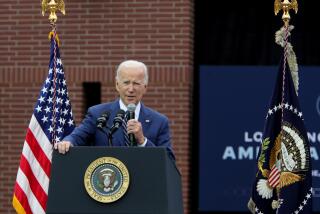Bush to Unveil New Medicare Drug Plan
- Share via
WASHINGTON — President Bush today will unveil a new plan to provide prescription drug coverage to all 40 million Medicare beneficiaries, with the proviso that those who join HMOs or other managed-care plans would receive better benefits than those who stay in traditional programs, according to an outline released by the White House on Monday.
Bush, in his latest proposal, backs off only slightly from an earlier, controversial plan in which only elderly and disabled Medicare beneficiaries who join HMOs would receive the prescription drug benefit.
“This framework offers seniors better benefits and more choices,” two senior administration officials said in a telephone news conference. “The details,” they emphasized, “will be written by Congress.”
The broad outline, which Bush will discuss today in a speech to the American Medical Assn., appeared similar to a draft proposal that was summarily rejected by many lawmakers, including some leading Republicans.
Preliminary reactions to the new plan indicated that it too would face rough going in Congress. Sen. Edward M. Kennedy (D-Mass.) called it “a radical prescription for dismantling Medicare.”
And although Republicans and Democrats have promised passage of a Medicare drug benefit this year, Senate Minority Leader Tom Daschle (D-S.D.) said both sides would have to “find a way to bridge our differences.”
“There’s a big difference between capitulation and compromise,” he warned. “If they say, ‘Only this or nothing,’ it will probably be nothing.”
The administration officials declined to spell out the president’s bottom line -- his budget provides $400 billion over 10 years for Medicare modernization -- but they said Bush was optimistic.
Medicare’s 40 million beneficiaries used $87 billion worth of prescription medications last year, according to government estimates, yet only 24% of them had some form of drug coverage.
The White House’s earlier proposal, leaked to reporters in January, would have offered prescription drug coverage only to seniors who joined HMOs or PPOs -- preferred-provider organizations, which are loose networks of doctors. Under the new framework, “every beneficiary has access to prescription drug coverage,” one official said.
But seniors who choose to stay with their current doctors would get only a Medicare drug-discount card, which officials said would produce cost savings of 10% to 25%, and protection against catastrophic drug costs.
By contrast, seniors who join “enhanced Medicare,” the administration’s term for PPOs, would receive comprehensive prescription-drug benefits, free preventive services and limits on out-of-pocket expenses for drugs and other services, including hospitalization.
Members of “Medicare Advantage” HMOs would have similar benefits. For low-income seniors, the administration would offer an additional drug subsidy of $600 a year.
The administration’s framework provided no details on how much beneficiaries would have to pay in premiums, when catastrophic coverage would kick in or who would qualify for low-income coverage.
“How that works out ... is a matter of deliberation” with Congress, one official said, “but there is subsidized prescription-drug coverage for seniors, regardless of the option they choose.”
Until now, government efforts to bring managed-care efficiency and private competition to the Medicare program have produced mixed results. Over the last five years, about half of Medicare HMOs have dropped out of the Medicare program, forcing 2.5 million beneficiaries to find other health-care providers.
Administration officials have said they realize Medicare payments to HMOs have been too low, and their reform proposal would increase government payments.
For now, however, only 11% of Medicare beneficiaries belong to HMOs. So, even though the administration’s proposal would give beneficiaries substantial incentives to move into managed care, the White House also realized it was “important to provide some level of subsidized coverage to those who stay in traditional Medicare,” officials said.
The leading Medicare drug proposals considered by Congress last year would have cost $31 billion to $390 billion over 10 years.
Bush’s proposed 2004 budget provides $400 billion over 10 years. Plans floated by Democrats would be much more expensive.
A benefit proposal described by Daschle on Monday would cost roughly $608 billion over 10 years, and the price tag for a proposal also to be unveiled today by House Democrats is close to $900 billion over the same period, according to a congressional aide.
Senate Finance Committee Chairman Charles E. Grassley (R-Iowa) has been chief among congressional Republicans who have told the White House they would not support a drug benefit for only some Medicare enrollees.
Grassley was also displeased with the White House’s failure to consult GOP lawmakers as it shaped its earlier proposal. By Monday night, he had mellowed.
“The president looks like he’s taken steps in the right direction,” Grassley said. “I appreciate that.”
More to Read
Sign up for Essential California
The most important California stories and recommendations in your inbox every morning.
You may occasionally receive promotional content from the Los Angeles Times.













